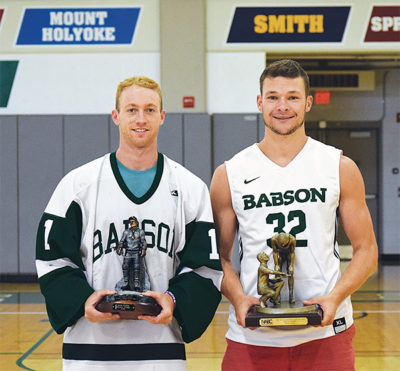Nearly 500 men’s basketball and ice hockey programs participated in NCAA Division III games last year, which equates to more than 8,000 players nationwide. So the odds of becoming the basketball or ice hockey national player of the year are slim. The odds of two athletes from the same institution being named as the best in their sports in the same year are almost inconceivable.

Photo: Jeremy Viens
Ice hockey’s Jamie Murray ’16 (left) and basketball’s Joey Flannery ’17 with their national player of the year trophies
Yet just one day apart last March, basketball player Joey Flannery ’17 and ice hockey player Jamie Murray ’16 were selected national players of the year by the National Association of Basketball Coaches and the American Hockey Coaches Association.
“I was very humbled to hear the news,” says Flannery. “It would not have happened without the hard work put in by our coaching staff and my teammates.”
As for Murray, being named hockey player of the year took him by surprise, so much so that he double-checked with coach Jamie Rice ’90 to make sure it was true. Over the years, Flannery and Murray have formed a close bond. “It was a fun thing for us to talk about when we got the news,” adds Murray, who is now a professional hockey player.
Flannery and Murray have led Babson to a combined five NCAA Tournament appearances and four conference championships. Men’s basketball advanced to its first NCAA Final Four in 2015, while men’s ice hockey appeared in the national quarterfinals in 2013 and 2014.
The duo shares many accolades, with Murray being named a three-time, first-team All-American and Flannery chosen as a two-time, first-team All-American. Flannery is the reigning three-time NEWMAC Player of the Year, and Murray was selected conference goaltender of the year three times and conference player of the year twice.
They also share the trait of pushing themselves to be their best. “I want to show in every game how good I can be in order to prove that I can play at the next level,” says Flannery.
Murray echoes Flannery’s sentiments on having a competitive nature. “There are always days when you feel a little slow or tired,” he says, “but nothing wakes me up like letting in a bad goal during practice. There are times when I would like to be a little less competitive, but it isn’t something I can just turn off, and that has really helped me on the ice.—Scott Dietz, associate director of athletics
